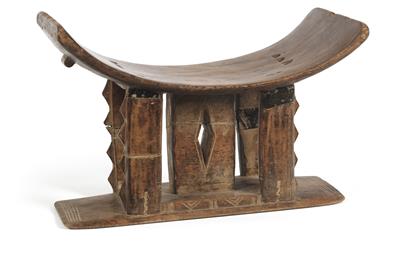Ashanti, Ghana: an Ashanti stool in its typical form.

A stool, carved from a single piece of light-coloured wood. In the characteristic Ashanti form: with a wide, rectangular and curved seat, on a rectangular base plate. In between are four angular side supports with spiked decorations on the outside. The solid rectangular central support is embellished by a perforating diamond carved in its middle. A few linear geometric reliefs decorate the entire piece. All five supports have previous breaks that have been partly glued and partly closed with brass cuffs as original repairs. Two small pieces are broken off the edge of the seat. Overall, still a piece with good shiny patina as a result of very long use.
It was the Ashanti custom for every man and woman to have their own stool. Alongside their pragmatic use, the stools also have a spiritual meaning. They served as the seat of the owner’s soul. When the stool was not used, it was leaned aslant against a wall in order to prevent other ‘souls’ passing by from sitting on it. Should a high dignitary pass away, they stool would be dyed black. This piece of furniture thus became a sacred object of recollection, of remembering one’s ancestors. It would hence be venerated, sacrificed and no one was allowed to sit on it (see cat. no. 140). Height: 24 cm (seat, at centre), 36 cm (side). First half of the 20th century. (ME)
Provenance:
Austrian Private Collection.
Lit.:
'Afrikanische Sitze' by Sandro Bocola, ill. 35, 36.
Specialist: Erwin Melchardt
 Erwin Melchardt
Erwin Melchardt
+43-1-515 60-465
erwin.melchardt@dorotheum.at
09.06.2016 - 17:00
- Realized price: **
-
EUR 688.-
- Starting bid:
-
EUR 550.-
Ashanti, Ghana: an Ashanti stool in its typical form.
A stool, carved from a single piece of light-coloured wood. In the characteristic Ashanti form: with a wide, rectangular and curved seat, on a rectangular base plate. In between are four angular side supports with spiked decorations on the outside. The solid rectangular central support is embellished by a perforating diamond carved in its middle. A few linear geometric reliefs decorate the entire piece. All five supports have previous breaks that have been partly glued and partly closed with brass cuffs as original repairs. Two small pieces are broken off the edge of the seat. Overall, still a piece with good shiny patina as a result of very long use.
It was the Ashanti custom for every man and woman to have their own stool. Alongside their pragmatic use, the stools also have a spiritual meaning. They served as the seat of the owner’s soul. When the stool was not used, it was leaned aslant against a wall in order to prevent other ‘souls’ passing by from sitting on it. Should a high dignitary pass away, they stool would be dyed black. This piece of furniture thus became a sacred object of recollection, of remembering one’s ancestors. It would hence be venerated, sacrificed and no one was allowed to sit on it (see cat. no. 140). Height: 24 cm (seat, at centre), 36 cm (side). First half of the 20th century. (ME)
Provenance:
Austrian Private Collection.
Lit.:
'Afrikanische Sitze' by Sandro Bocola, ill. 35, 36.
Specialist: Erwin Melchardt
 Erwin Melchardt
Erwin Melchardt
+43-1-515 60-465
erwin.melchardt@dorotheum.at
|
Buyers hotline
Mon.-Fri.: 10.00am - 5.00pm
kundendienst@dorotheum.at +43 1 515 60 200 |
| Auction: | Tribal Art - Africa |
| Auction type: | Saleroom auction |
| Date: | 09.06.2016 - 17:00 |
| Location: | Vienna | Palais Dorotheum |
| Exhibition: | 04.06. - 09.06.2016 |
** Purchase price incl. charges and taxes
It is not possible to turn in online buying orders anymore. The auction is in preparation or has been executed already.
